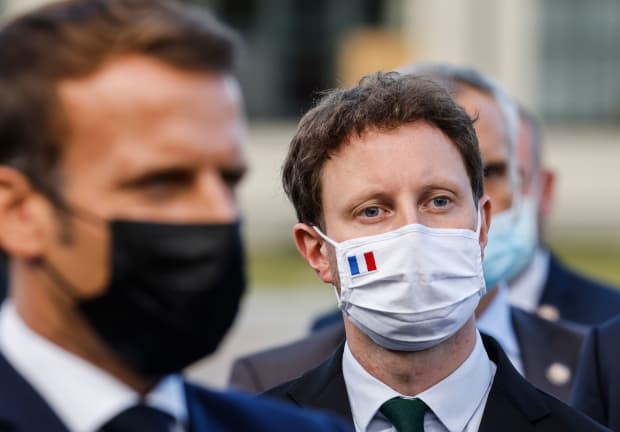This post was originally published on this site

France’s European affairs minister Clement Beaune (R).
AFP via Getty Images
European affairs minister Clement Beaune said on Friday that France wouldn’t hesitate to veto a trade treaty between the European Union and the U.K. it would deem contrary to its interests, as negotiators from both sides are still hard at work, with just a few days left to strike a deal.
- “I still hope we can have a deal but we will not accept one that is bad for France. If there was a deal and if it wasn’t good, we would oppose it with our veto right,” Beaune said in a radio interview. A U.K.-EU treaty would have to be approved unanimously by the 27 EU member governments.
- French President Emmanuel Macron has been adamant that an important part of the fishing rights of French fleets in British waters should be preserved in a future deal, and is said to have raised concerns about the concessions offered to the U.K. by EU chief negotiator Michel Barnier.
- In a sign, however, that the French are readying to approve a possible agreement, Macron’s prime minister, Jean Castex, traveled to the fishing port of Boulogne-sur-Mer on Thursday to tell fishermen to prepare for a “new era,” and to warn them that “a negotiation must lead to compromises.”
- According to EU sources, France asked in return for concessions on fishing that the U.K. get closer to EU positions on the main bone of contention between the two sides — the rules that would govern a “level playing field” on environmental and social regulations.
Read: Could a trade deal be in sight, after 10 months of fruitless EU-U.K. negotiations?
The outlook: Beaune is a close associate and former personal adviser of Macron and his tongue didn’t slip. But warning that France would veto a deal also means that the absence of veto would then qualify it as ‘good’ — helping the government to spin it for its domestic audience in the next few weeks.
If the negotiators do come to an agreement, however, it’s unlikely that France would risk being alone in vetoing it. It has allies on the fishing question, with the Netherlands and Denmark aligned on the same position, but scuttling a deal for an economic activity that is insignificant compared with the wider U.K.-EU trade would be irrational and self-destructive.
The more important issue — on a level playing field — is in fact more difficult to settle, with the U.K. government still torn between the economic need for a deal and the political concern of conceding too much on “sovereignty” to the EU.
Read: Here’s why cod and haddock threaten to scuttle trade talks as both EU and U.K. send Brexit warnings

